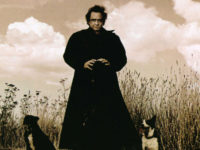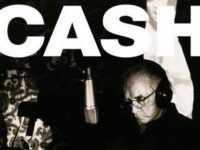On the one hand, Rick Rubin is just your typical monk-bearded, Buddhist-adjacent, music loving WWE fan. On the other hand …
Ok wait. That’s already quite a hand.
Rubin is the premier music producer of our time. He is a prominent figure in the histories of rap, metal, country, rock and more. From Johnny Cash to Wu Tang Clan, from Donovan to Linkin Park, a casual glance at his production credits is overwhelming.
As difficult as it is to narrow it down, here are Rick Rubin’s three most important albums:
BEASTIE BOYS – LICENSED TO ILL (1986): Licensed to Ill is one of the most revolutionary albums of the ’80s. Its combination of rap and rock might seem like a tired concept decades after its release, but at the time it was groundbreaking. There were some precedents, most popularly the Rubin-produced Run-DMC/Aerosmith collaboration on “Walk This Way,” but it had never been explored on this scale.
Sure, rap/rock has been ubiquitous since the release of Licensed to Ill – and thanks to it – but has anyone ever done it better? Rick Rubin’s production fuses rap and rock without losing the essence of either, while the Beastie Boys were fresh and at the top of their game.
“Fight for Your Right,” “No Sleep Till Brooklyn,” and “Brass Monkey” were the hits, but album tracks like “Rhymin and Stealin,” “She’s Crafty,” “Slow and Low” are even better examples of Licensed to Ill’s ingenuity.
JOHNNY CASH – AMERICAN RECORDINGS (1994): By the early ’90s, the country music establishment had turned its back on all of its legends. Waylon Jennings, Willie Nelson and Johnny Cash were relegated to the dust bins of history, playing demeaning greatest-hits sets to small crowds at county fairs. Because labels wouldn’t promote their music and country radio wouldn’t play it, they were also basically shut out from making records.
Rick Rubin’s single most important accomplishment is saving Johnny Cash from the cruel fate that the country music establishment forced on him. Thanks to Rubin, Cash was able to unleash the same creative drive that was behind his legendary ’50s and ‘60s material, a restless spirit that had been dampened and deadened for decades.
This career renaissance began with the first of Cash’s American Recordings albums. The legendary all-acoustic record, featuring just Cash and his guitar, puts the primal power of his voice front and center. Loss, despair, God, redemption, humor, love – the entire human condition is here.
Cash gets to the soul of each track here, whether he’s resurrecting older murder ballads (opening “Delia’s Gone”), debuting his own new material (“Drive On,” the affecting story of a Vietnam vet), or taking on songs from writers as diverse as Leonard Cohen, Kris Kristofferson, and Misfits founder Glen Danzig (who evidently wrote the haunting “Thirteen” for Cash in under 20 minutes).
TOM PETTY – WILDFLOWERS (1994): By 1994, Tom Petty had already had two major creative phases, both of which brought him significant popularity. The first was in the late ’70s, when iconic tracks like “American Girl” and “Refugee” first brought him to prominence. He then continued evolving into the ’80s and early ‘90s, reaching his peak popularity with huge hits like “Don’t Come Around Here No More,” “Running Down a Dream,” “Into the Great Wide Open,” and especially “Free Fallin’.”
Despite all of that, the majority of Tom Petty fans – and, seemingly, Petty himself – thought his best album was the Rick Rubin-produced Wildflowers. It features easily his most mature and engaging songwriting, which is especially apparent on album tracks like heavy “House in the Woods,” low-key masterpiece “Crawling Back to You,” and heartbreaking “Only a Broken Heart.”
And, of course, I haven’t even mentioned the most iconic tracks: “You Wreck Me,” “You Don’t Know How it Feels,” “It’s Good to Be King,” and a gorgeous title cut which has become something of a standard, having been covered by everyone from Trampled by Turtles to Miley Cyrus.
- Dan Tedesco, alt-folk rocker: Something Else! Interview - February 22, 2022
- This Is a Tough One: Saying Goodbye to My Guy, Meat Loaf - January 22, 2022
- Tom Petty, Johnny Cash + Beastie Boys: Rick Rubin’s Most Important Albums - March 10, 2021



